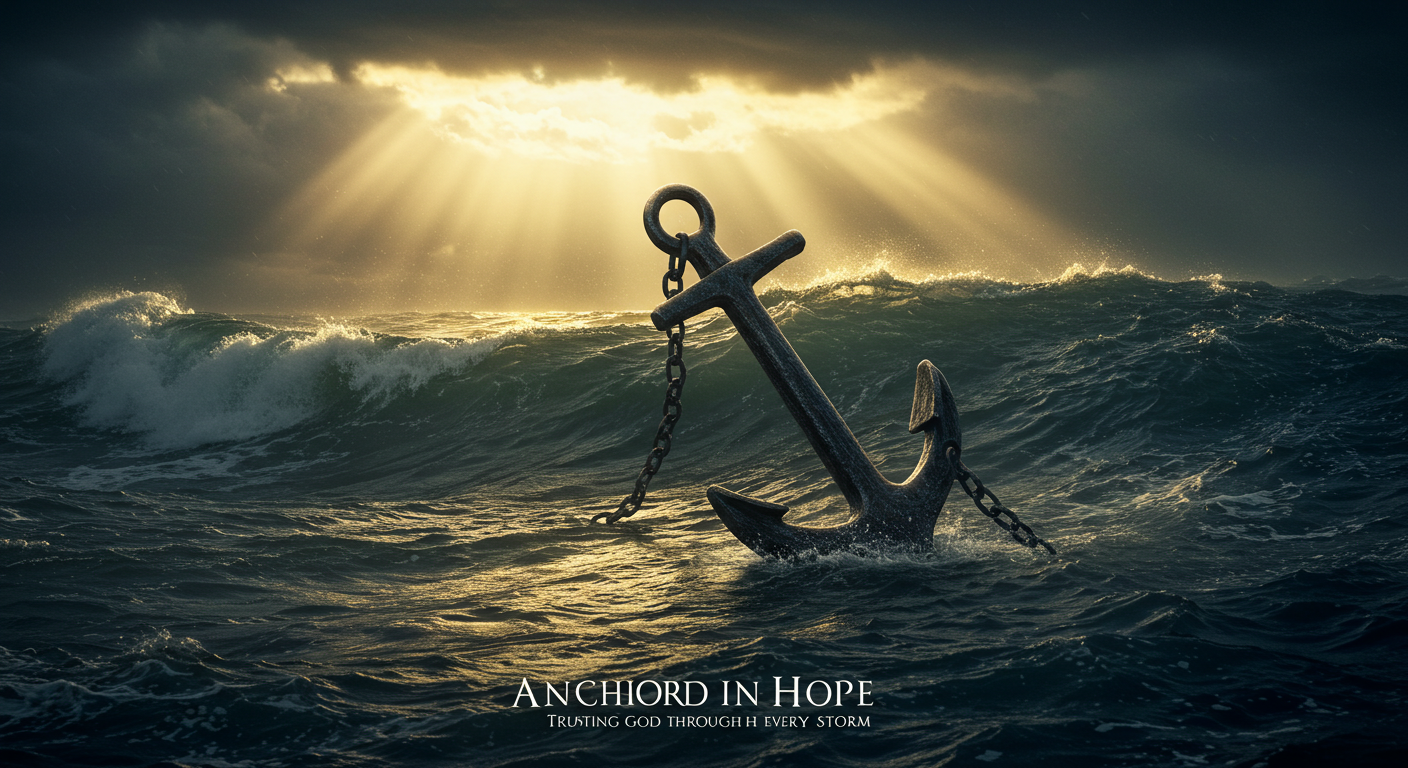Anchored In Hope: Trusting God Through Every Storm
You’ve probably felt it: the world tilting beneath your feet, the sky darkening fast, and fear pressing in on every side. Whether it’s a sudden loss, a chronic struggle, or the slow drip of disappointment, storms test you. The good news is that you don’t have to drift without a mooring. The Bible gives you a lifeline — a spiritual metaphor that calls hope an anchor for the soul. When you are anchored in hope, you can stand steady even when the winds howl.
This article is for you if you want practical, biblical, and pastoral guidance on how to remain anchored in hope through life’s storms. You’ll find Scripture woven throughout (linked to Bible Gateway), practical steps you can take today, and encouragement for the seasons when hope feels thin. Let’s walk through what it looks like to be anchored in hope and how that anchor keeps you secure.
Why the Anchor Metaphor Matters
Hope as an anchor is not just pretty language — it’s a vivid biblical image. The author of Hebrews writes, “We have this hope as an anchor for the soul, firm and secure” Hebrews 6:19. Anchors hold ships steady in turbulent water; similarly, hope holds your inner life steady amid fear, grief, and uncertainty. When the anchor is firmly set, the ship doesn’t have to fight every gust. You don’t have to be suspended above your circumstances; you can be securely attached to a reality larger than the storm.
When you picture your soul anchored, imagine the tension between your fear and your faith. The anchor doesn’t remove the waves, but it keeps you from capsizing. That’s the practical promise: being anchored in hope doesn’t mean you’ll never feel afraid — it means your fears won’t determine your course.
What It Means To Be Anchored In Hope
Being anchored in hope is both a spiritual posture and a daily practice. Spiritually, it means your ultimate confidence rests not in circumstances, wealth, or personal strength, but in God and His promises. Practically, it means you orient your thoughts, habits, and responses around that confidence.
Hope isn’t wishful thinking. The Bible describes hope as confident expectation — an anticipation rooted in God’s character and past faithfulness. You hold on to God’s promises because He has proven trustworthy. That’s why Hebrews speaks of hope as “firm and secure” — it’s anchored in a God who does not change.
When you are anchored in hope, you find that fear and doubt don’t disappear, but they lose their authority. You begin to interpret events through the lens of God’s sovereignty and goodness rather than through panic or despair. That shift changes everything: the way you pray, the choices you make, and how you respond to others.
The Reality of Storms: Why You’ll Face Them
It helps to be realistic: storms are part of life. Scripture acknowledges this plainly. Jesus told His followers that in this world you will have trouble, but He also gave a hopeful command: “In this world you will have trouble. But take heart! I have overcome the world,” John 16:33. Storms come for many reasons — discipline, testing, refinement, consequences, or simply living in a fallen world. They do not always indicate divine abandonment.
James frames trials as opportunities for spiritual growth: “Consider it pure joy, my brothers and sisters, whenever you face trials of many kinds, because you know that the testing of your faith produces perseverance” James 1:2-4. That doesn’t mean you enjoy the pain itself; it means you recognize that God can use hardship to produce a sturdier faith and a deeper hope.
You may also be comforted to know that suffering is not wasted. Romans says that suffering produces perseverance; perseverance, character; and character, hope — a hope that doesn’t disappoint because it’s poured into your heart by the Holy Spirit Romans 5:3-5. The hope you anchor to is tested and often strengthened precisely through the storms you would rather avoid.
How Hope Anchors Your Soul Through the Storm
Hope stabilizes you spiritually, emotionally, and often physically. When you anchor in hope, your responses to hardship are less reactive and more rooted. Practically, this looks like calmer prayers, steadier relationships, and clearer discernment. Hope gives you a horizon to aim at, so your immediate circumstances don’t swallow your perspective.
The psalmist models this posture of trust: “God is our refuge and strength, an ever-present help in trouble” Psalm 46:1-3. When trouble comes, knowing God as refuge lets you move from panic to shelter. Isaiah offers a similar comfort: “When you pass through the waters, I will be with you; and when you pass through the rivers, they will not sweep over you” Isaiah 43:2. Those promises don’t promise a painless life; they promise presence and protection.
Hope also affects your rhythm of life. Instead of hoarding resources, you’re more inclined to generosity; instead of withdrawing, you’re more likely to seek community. In short, anchored hope transforms survival into witness.
Jesus Calms the Storm: A Picture of Anchor and Presence
One of the most striking biblical stories of being anchored in hope is Jesus calming the storm. In the Gospel account, the disciples face a violent squall and fear for their lives while Jesus sleeps. When they panic and wake Him, He rebukes the wind and says to the sea, “Quiet! Be still!” The disciples are amazed, and Jesus asks, “Why are you so afraid? Do you still have no faith?” Mark 4:35-41. Matthew records a similar exchange when the disciples cry out, “Lord, save us! We’re going to drown!” He replies, “You of little faith, why are you so afraid?” and then calms the storm Matthew 8:23-27.
This story teaches you two things: Jesus is with you in the boat, and He has authority over the elements that terrify you. Being anchored in hope doesn’t mean storms won’t come, but it does remind you that Jesus is present and powerful. Your faith isn’t a talisman; it’s trust in a Savior who stands with you and acts on your behalf.
Practical Ways to Stay Anchored In Hope
Being anchored in hope is both theological and practical. You’ll need spiritual disciplines and relational supports that keep your anchor set.
- Commit to Scripture daily. God’s promises are the chain that connects your anchor to the bedrock. Meditating on promises spots fear for what it is — a reaction to the present, not the final word.
- Pray honestly and persistently. Prayer is how you communicate with the One who holds the future. Even short, repeated prayers shape your posture and keep you connected.
- Stay in the community. Hope grows when it’s shared. Let others carry you when the weight gets heavy, and be willing to receive help.
- Practice gratitude and worship. Joy and thanksgiving aren’t the denial of hardship; they’re acts that reorient your heart to God’s goodness amid difficulty.
- Seek wise counsel and professional help when needed. Being anchored in hope does not mean refusing counseling or help for physical, emotional, or mental health struggles.
These practices anchor you in concrete ways. When you cultivate them, you build a life where hope is not just an emotion, but a lived reality.
When Hope Feels Distant
There will be days, even long seasons, when hope seems like a thin thread. You might feel abandoned, exhausted, or numb. In those moments, Scripture does not shun your honesty. The psalmist cries out in despair and then reorients his soul: “Why, my soul, are you downcast? Why so disturbed within me? Put your hope in God, for I will yet praise him” Psalm 42:11. You’re allowed to name your pain and still nudge your heart toward trust.
If hope feels distant, start with small acts of faith: a short prayer, a single verse, a phone call to a trusted friend. Waiting is a kind of faithful endurance. Scripture often rewards those who persevere quietly. Remember God’s promise to be with you in the deep places: “When you pass through the waters, I will be with you” Isaiah 43:2. Even when you can’t feel it, that presence is real.

Biblical Examples of Being Anchored in Hope
You’re not the first person to hang on in the dark. Scripture is full of people who were anchored in hope even when circumstances seemed against them. Abraham is a great example — he believed God’s promise against all hope and became the father of many nations Romans 4:18. His hope was not mere optimism but faith in God’s promise.
The “Hall of Faith” in Hebrews 11 showcases many who trusted God despite not seeing the end of their stories. Hebrews calls faith “confidence in what we hope for and assurance about what we do not see” Hebrews 11:1. Their lives remind you that being anchored in hope often involves stepping forward with God before circumstances change.
Joseph’s story is another powerful example. Betrayed, imprisoned, and forgotten, Joseph’s hope was anchored in God’s purposes and promises. What looked like ruin became the path to restoration and blessing. These stories reassure you: God’s redemptive work often emerges through the very storms that threaten to undo you.
Anchored In Hope For the Future
Hope is forward-looking. It casts a net over tomorrow and anchors you in God’s ultimate plans. The Apostle Paul writes that present sufferings are not worth comparing with the glory that will be revealed, and that creation itself waits in eager expectation for the children of God to be revealed Romans 8:18-25. That eschatological horizon — the promise that God will make all things new — fuels your hope today.
Peter reminds you that your hope is living and sure because of the resurrection: “Praise be to God and Father of our Lord Jesus Christ! In his great mercy, he has given you new birth into a living hope through the resurrection of Jesus Christ from the dead” 1 Peter 1:3-5. Being anchored in hope means your confidence is not merely for this life; it is grounded in the eternal reality of Christ’s victory.
When you keep eternity in view, temporary hardships shrink in significance without being trivialized. Hope gives you the courage to endure because you believe God is working toward a good and ultimate restoration.
Living Out Hope in Community
You weren’t meant to weather storms alone. The Christian life is communal by design, and hope flourishes in relationships. The apostle Paul instructs the church to “carry each other’s burdens” and, in this way, to fulfill Christ’s law Galatians 6:2. When you bear one another’s burdens, you make hope tangible.
Hebrews presses you to encourage one another daily so no one is hardened by sin due to isolation: “Let us consider how we may spur one another on toward love and good deeds” Hebrews 10:23-25. Community brings perspective, prayer, practical help, and companionship — all vital components of staying anchored in hope.
You’ll find that sometimes your presence is the hope someone else needs. Hope is contagious when lived out in love and consistency.
Obstacles to Being Anchored In Hope (and How to Overcome Them)
Certain habits or beliefs can loosen your anchor. Pride, self-reliance, bitterness, and unconfessed sin can all make you more vulnerable to being swept away. You’ll also face cultural pressures that equate stability with self-sufficiency rather than dependence on God.
Overcoming these obstacles requires intentionality. Here are practical moves you can make:
- Confess and repent: Unresolved sin creates spiritual friction that destabilizes hope.
- Cultivate humility: Allow yourself to say, “I need help,” whether in prayer, counseling, or community.
- Rehearse God’s faithfulness: Keep a journal of answered prayers and memories of deliverance to remind your heart.
- Limit negative influences: If certain media or relationships stoke fear or cynicism, set boundaries.
These are not quick fixes, but they are essential maintenance for a hope that holds. Rooting your life in disciplines and relationships that reflect gospel realities will keep your anchor secure.
Prayer, Scripture, and Worship: The Three Cords That Tie Your Anchor
Prayer, Scripture reading, and worship are intertwined practices that bind you to God. Prayer keeps you connected to the One who holds the future. Scripture reminds you of God’s promises and equips you for every challenge. Worship shifts your heart’s allegiance from circumstances to the character of God.
Paul gives a practical exhortation: do not be anxious but bring your requests to God with thanksgiving, and you will experience God’s peace that guards your heart and mind Philippians 4:6-7. That peace is the fruit of being anchored in hope — a peace that doesn’t deny reality but rests in God’s care.
Psalm 62 offers another posture of rest: “Find rest, O my soul, in God alone; my hope comes from him” Psalm 62:5-6. These practices are not formulas, but lifelines. They keep your anchor attached to the bedrock of God’s character.
Holding Steady When You Don’t Understand
One of the hardest parts of storms is the mystery. You may not see reasons for pain or understand God’s timing. The Bible doesn’t promise full explanations for every hardship, but it does invite you into trust. King David models raw honesty in prayer when he asks, “How long, Lord? Will you forget me forever?” and yet he moves toward praise Psalm 13:1-6. That movement from complaint to trust is an important part of being anchored in hope.
Trust sometimes looks like waiting without answers, doing the next right thing without understanding, and clinging to God’s presence rather than to an explanation. When you choose to trust in God’s goodness and sovereignty despite mystery, your hope becomes resilient, not fragile.
Hope That Perseveres: Long-Term Faithfulness
Anchored hope is not only for one-off crises; it’s a lifelong posture. Paul’s letter to the Romans reminds you that suffering and hope are tightly linked in the Christian life, producing perseverance and strengthening your character Romans 5:3-5. Perseverance means continuing in faithfulness even when the payoff is delayed or unclear.
A life anchored in hope will show certain marks: endurance under pressure, generosity in scarcity, and joy that persists alongside sorrow. These marks develop over time as you repeatedly choose trust over panic, obedience over avoidance, and community over isolation.
The Power of Small Acts of Faith
You don’t need to wait for a dramatic conversion to be anchored. Small, ordinary acts of faith compound over time. Waking up and praying, reading a verse and memorizing it, choosing to forgive, sending a text of encouragement — these are the little anchors that steady you on hard days. Jesus commends faith the size of a mustard seed, capable of moving mountains. Small faithfulness matters.
As you build these small habits, your heart rewires. Courage becomes easier. Hope becomes your default orientation. The anchor becomes heavier and more reliable.
Final Encouragement: You Are Not Alone
If you’re in the middle of a storm, know that being anchored in hope is available to you now. God’s promises hold: He is near to the brokenhearted and saves those who are crushed in spirit. The anchor of hope is attached to God’s unchanging promise to be with you, to work for your good, and to bring ultimate restoration.
If you’re tempted to give up, remember the cloud of witnesses who persevered before you Hebrews 11:1, and the promise that present sufferings are working toward an incomparably greater future Romans 8:18-25. Hold on. Pray. Reach out. Keep reading Scripture. Stay in the Christian community. These are not platitudes — they are the practical means God uses to keep you anchored in hope.
When storms come, you can shout into the wind, not with panic, but with the cry of faith: “Lord, save us!” and then wait on the One who calms seas and hearts Matthew 8:23-27. You aren’t drifting by accident; you’re being held by a promise that is firm and secure Hebrews 6:19.
Explore More
For further reading and encouragement, check out these posts:
👉 7 Bible Verses About Faith in Hard Times
👉 Job’s Faith: What We Can Learn From His Trials
👉 How To Trust God When Everything Falls Apart
👉 Why God Allows Suffering – A Biblical Perspective
👉 Faith Over Fear: How To Stand Strong In Uncertain Seasons
👉 How To Encourage Someone Struggling With Their Faith
👉 5 Prayers for Strength When You’re Feeling Weak

📘 Jesus and the Woman Caught in Adultery – Grace and Mercy Over Judgement
A powerful retelling of John 8:1-11. This book brings to life the depth of forgiveness, mercy, and God’s unwavering love.
👉 Check it now on Amazon 🛒💥
🔥 “Every great message deserves a home online.” 🌍💬🏡
Don’t let your calling stay hidden. Start a Christian blog or website using Hostinger — with 99.9% uptime, a free domain, and SSL, your voice can shine for God’s glory anytime, anywhere.
💥 Begin today. 🛒 Try it RISK-FREE! ✅
✝️ “Your body is God’s temple — care for it with purpose.” 💪💖🏛️
Renew your energy and restore balance naturally. Mitolyn helps support a healthy metabolism, giving you the vitality to live out God’s calling with strength and confidence.
🔥 Unlock Your Metabolic Power! ⚡Burn More Calories & Feel Great With Mitolyn. 💪
👉 Start Today. 🚀 Check Price Now. 🛒💰
💰 As a ClickBank & Amazon Affiliate, I earn from qualifying purchases.
📖 Acknowledgment: All Bible verses referenced in this article were accessed via Bible Gateway (or Bible Hub).
🚀 Want to explore more? 👉 Dive into our new post on Why Jesus? and experience the 🔥 life-changing truth of the Gospel!






